What Is Milwaukee Water Commons?
The recently-formed grassroots group, which looks to make sure all citizens benefit from Milwaukee's water resources, holds a fundraiser.
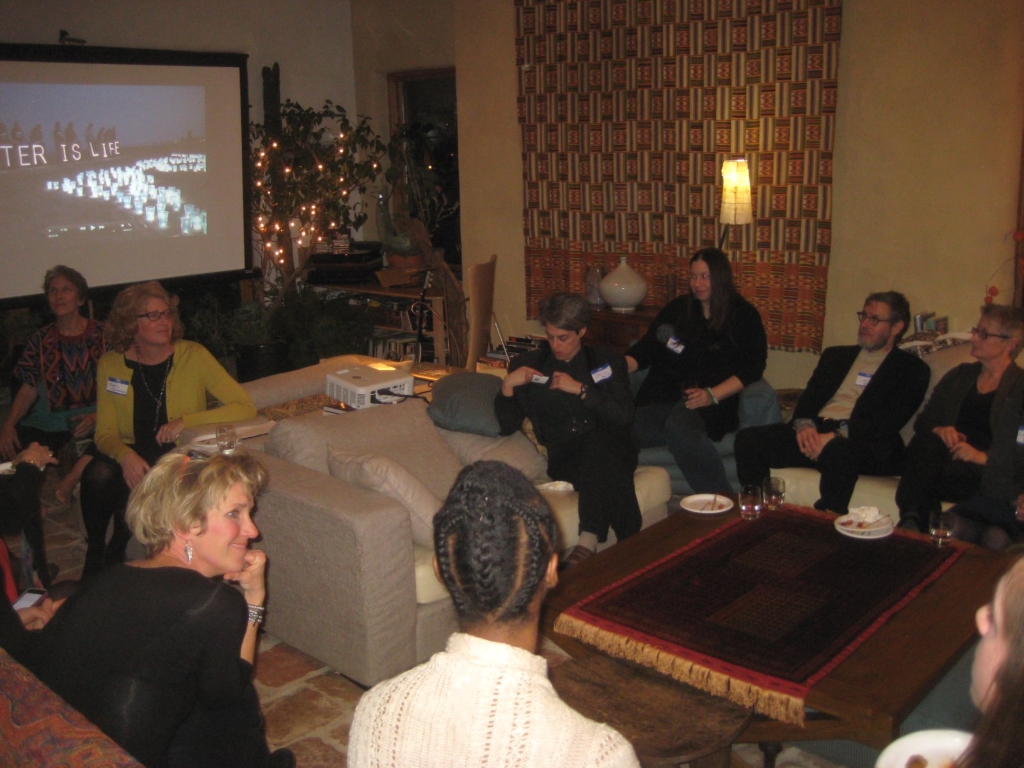
Members of the Milwaukee River Commons gather at Julilly Kohler’s home on January 21st.. Photo by Michael Horne.
In his recent series in Urban Milwaukee, David Holmes argues that “Milwaukee’s urban revitalization as a whole has been linked in multiple ways to the restoration of its freshwater resources.”
The city has the advantage of a lakefront that has been only lightly developed and its distinctive, tri-furcated estuary in the form of the Milwaukee, Menomonee and Kinnickinnic rivers. These bodies are not prone to great flooding, making them ideal environmental corridors that will accommodate human interaction. Plus, he writes, we have spent tremendous sums improving our sewers and other riparian infrastructure, where other cities have not yet begun.
In short, it is time to reap the dividends of our great liquid assets.
A grassroots group called Milwaukee Water Commons, formed in 2013, believes the public should have a seat at the table when water policy issues are addressed. Defined as a “cross-city network that fosters connection, collaboration and broad community leadership on behalf of our waters,” the group held a fundraiser for 34 people at the riverfront home of Julilly Kohler on January 21st.
The hosts of the program were the two co-directors of Milwaukee Water Commons: Alexa Bradley, a founder of the Great Lakes Commons, to which this group is connected, of the Water Commons, and Ann Brummitt, who was previously involved in the Milwaukee River Work Group, a project that led to the preservation of 878 riverfront acres in the city of Milwaukee.
“Decisions about the care and responsibility for our waters must involve all of us,” the group announced in a flyer. The public has a stake because “water belongs to no one and cannot be owned.”
As the guests snacked on food catered by Amilinda‘s, Bradley and Brummitt gave a brief presentation, aided by a video by Jenny Plevin a program director at docUWM. Milwaukee Water Commons Artist-in-Residence Melanie Ariens had already greeted the guests at the door of the home, where one of her handmade prints — dated 2015 — was available to donors of $500 or more.
So, why the Water Commons?
Bradley stated her case simply in an address to the audience. “Milwaukee is a water hub. We must put stewardship and community at the center.”
“What would it mean to you to be a water city?” attendees were asked.
Kohler said “access to the riverbanks” would be of importance. The river used to be filled with swimming schools and fishing holes. [“Connections and Reconnections” has been a theme in Kohler’s community vision. See, for example, the Holton Marsupial Bridge.]
Becca Kranitz said she would be interested in water sculptures, and Anne Basting, founder of Time Slips (a non-profit that helps people with memory loss), said she would like to visit the theme of the perpetual cycle of water. Basting was there with her husband, documentary filmmaker Brad Lichtenstein
Tim Ehlinger, a UW-Milwaukee professor of biological sciences, said the city has to be dynamic to match the dynamic nature of water. “Everybody in Milwaukee has a connection to the water. Everybody has a personal story. What is the collective story?”
Brummitt noted that All People’s Church and Alice’s Garden developed water projects that made sense in their (landlocked) neighborhoods. “People are hungry to learn” about the water resources.
“We have the opportunity to become a national leader,” she suggested, with programs like the Water Commons. And, despite recent gains, “a lot more can be done,” she said. “The river needs work, the lake needs care. The Great Lakes renew at about 1 per cent a year,” she said, so things take time and need continual attention.
But what of the industrial, agricultural, commercial, residential and other uses of water? “Economic prosperity and sustainability are not mutually exclusive,” she said.
Introducing a yin-yang continuum, she said the “Water Hub is a great idea — but a water hub is economic. A Water Commons is more equitable.”
David Dragseth, the pastor of Lake Park Lutheran Church, was asked to reflect on the question of “Where did you meet water recently?”
“Well, I baptized three kids this week,” he joked, adding, “I skiied with a friend.” That experience caused him to reflect on the bounty of water. Amen.
Charlyn Moore, the director of Urban Underground brought her perspective. She is from the island of Jamaica, she told people, and has a slightly different take on water than do the customers of the Milwaukee Water Works and the Milwaukee Metropolitan Sewerage District.
“We were without indoor plumbing. We had to fill drums with water. Here, water is available freely, but people freely took advantage of a resource that literally other people die for.”
Event Photos
Plenty of Horne
-
Milwaukee Modernism Gains National Awards
 Dec 15th, 2025 by Michael Horne
Dec 15th, 2025 by Michael Horne
-
New Rainbow Crosswalks Mark Milwaukee’s LGBTQ+ History
 Oct 8th, 2025 by Michael Horne
Oct 8th, 2025 by Michael Horne
-
Welcome Back, Tripoli Country Club!
 May 27th, 2025 by Michael Horne
May 27th, 2025 by Michael Horne


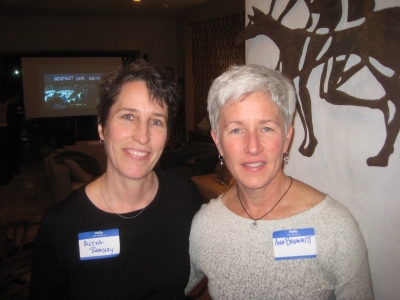
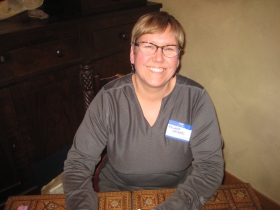
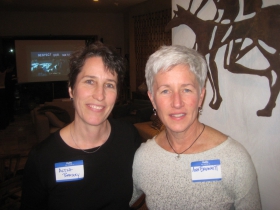
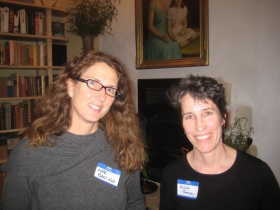
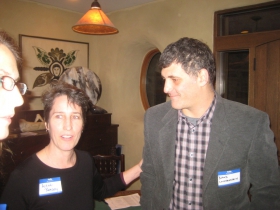
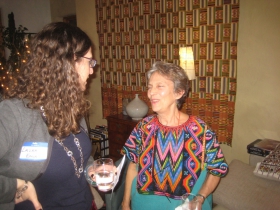
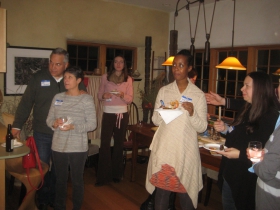

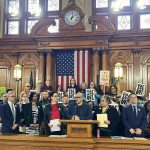


















“the group held a fundraiser for 34 people”. Who are those people and what’s the money for?
This is the Water Hub dream in a nutshell: “Everybody in Milwaukee has a connection to the water. Everybody has a personal story. What is the collective story?”
Who cares about the personal and collective connection to water. Economic development is the main priority. Without that, this water hub is just a house built on sand that won’t last the test of time.
A better question is: Where does the capital come from to finance large R&D projects necessary to create competitive products in a crowded market?
Blurondo asks “who are these people and what is the money for”. I was the host, many of the people who support it were named in the story. I support it because I think that how the water is used and who uses it should not only be the domain of the monied commercial interests in the area. I think our rivers, the attached watersheds and the Lake is indeed a Commons– like our air– and belongs to everyone, not just the 1%.
The historical “Tragedy of the Commons” is when certain interests try to “take it all” and don’t leave anything worthwhile on the table for others…. and that is what will happen if everyone doesn’t see that water is not merely a commodity to be bottled and sold or contaminated by industrial waste– and the community gets to help define its uses.
I personally would love to see the return of the historic swimming schools and piers that used to dot the rivers before its industrial contamination that was so bad you evidently could smell it 10 miles out on the Lake– and the rivers could become a place for everyone to swim and play again.
I think that would be amazing and very cool for Milwaukee…. and would make Milwaukee a place people would be drawn to and talk about.
Thanks to Julilly, Ann and everyone at Milwaukee Water Commons for your efforts at bringing citizens into the water-related decision-making process. I have been to many cities, and Milwaukee is truly a gem – precisely because of its parks, rivers and Great Lake. While in Denver last week, I marveled at the amount of downtown redevelopment, much of it as a result of new mass transit and pedestrian options. But while their weather is hard to beat, I would never want to live there. It is a dry, arid city with no lakes and only a tiny, hidden-away rivulet on the edge of downtown that only serves as a reminder of what that city does not have – moisture. Milwaukee is among the most livable of cities, and we need to celebrate it and protect and nurture its natural resources. And should we embrace the concept of Milwaukee as a Global Water City. Yes, we should!